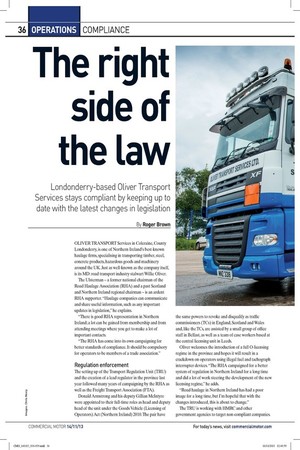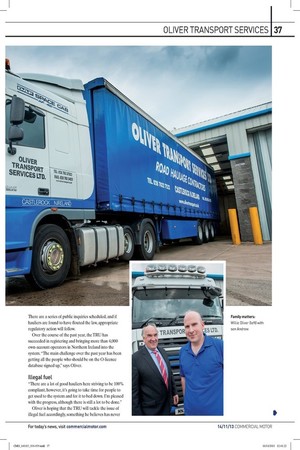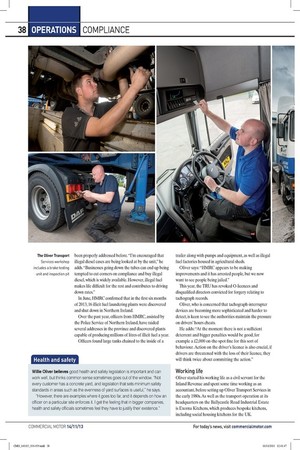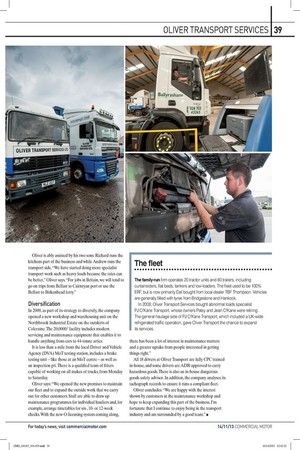The right side of the law
Page 29

Page 30

Page 31

Page 32

If you've noticed an error in this article please click here to report it so we can fix it.
Londonderry-based Oliver Transport Services stays compliant by keeping up to date with the latest changes in legislation By Roger Brown
OLIVER TRANSPORT Services in Coleraine, County Londonderry, is one of Northern Ireland's best-known haulage firms, specialising in transporting timber, steel, concrete products, hazardous goods and machinery around the UK. Just as well-known as the company itself, is its MD: road transport industry stalwart Willie Oliver.
The Ulsterman — a former national chairman of the Road Haulage Association (RHA) and a past Scotland and Northern Ireland regional chairman — is an ardent RHA supporter. "Haulage companies can communicate and share useful information, such as any important updates in legislation," he explains.
"There is good RHA representation in Northern Ireland; a lot can be gained from membership and from attending meetings where you get to make a lot of important contacts.
"The RHA has come into its own campaigning for better standards of compliance. It should be compulsory for operators to be members of a trade association." Regulation enforcement
The setting up of the Transport Regulation Unit (TRU) and the creation of a lead regulator in the province last year followed many years of campaigning by the RHA as well as the Freight Transport Association (FTA). Donald Armstrong and his deputy Gillian McIntyre were appointed to their full-time roles as head and deputy head of the unit under the Goods Vehicle (Licensing of Operators) Act (Northern Ireland) 2010. The pair have
the same powers to revoke and disqualify as traffic commissioners (TCs) in England, Scotland and Wales and, like the TCs, are assisted by a small group of office staff in Belfast, as well as a team of case workers based at the central licensing unit in Leeds.
Oliver welcomes the introduction of a full 0-licensing regime in the province and hopes it will result in a crackdown on operators using illegal fuel and tachograph interrupter devices. "The RHA campaigned for a better system of regulation in Northern Ireland for a long time and did a lot of work steering the development of the new licensing regime," he adds.
"Road haulage in Northern Ireland has had a poor image for a long time, but I'm hopeful that with the changes introduced, this is about to change."
The TRU is working with HMRC and other government agencies to target non-compliant companies.
There are a series of public inquiries scheduled, and if hauliers are found to have flouted the law, appropriate regulatory action will follow.
Over the course of the past year, the TRU has succeeded in registering and bringing more than 4,000 own-account operators in Northern Ireland into the system. "The main challenge over the past year has been getting all the people who should be on the 0-licence database signed up," says Oliver. Illegal fuel
"There are a lot of good hauliers here striving to be 100% compliant, however, it's going to take time for people to get used to the system and for it to bed down. I'm pleased with the progress, although there is still a lot to be done." Oliver is hoping that the TRU will tackle the issue of illegal fuel accordingly, something he believes has never
been properly addressed before. "I'm encouraged that illegal diesel cases are being looked at by the unit," he adds. "Businesses going down the tubes can end up being tempted to cut corners on compliance and buy illegal diesel, which is widely available. However, illegal fuel makes life difficult for the rest and contributes to driving down rates."
In June, HMRC confirmed that in the first six months of 2013,16 illicit fuel laundering plants were discovered and shut down in Northern Ireland.
Over the past year, officers from HMRC, assisted by the Police Service of Northern Ireland, have raided several addresses in the province and discovered plants capable of producing millions of litres of illicit fuel a year. Officers found large tanks chained to the inside of a
trailer along with pumps and equipment, as well as illegal fuel factories housed in agricultural sheds.
Oliver says: "HMRC appears to be making improvements and it has arrested people, but we now want to see people being jailed."
This year, the TRU has revoked 0-licences and disqualified directors convicted for forgery relating to tachograph records.
Oliver, who is concerned that tachograph-interrupter devices are becoming more sophisticated and harder to detect, is keen to see the authorities maintain the pressure on drivers' hours cheats.
He adds: "At the moment there is not a sufficient deterrent and bigger penalties would be good, for example a £2,000 on-the-spot fine for this sort of behaviour. Action on the driver's licence is also crucial, if drivers are threatened with the loss of their licence, they will think twice about committing the action." Working life
Oliver started his working life as a civil servant for the Inland Revenue and spent some time working as an accountant, before setting up Oliver Transport Services in the early 1980s. As well as the transport operation at its headquarters on the Ballycastle Road Industrial Estate is Exorna Kitchens, which produces bespoke kitchens, including social housing kitchens for the UK.
Oliver is ably assisted by his two sons: Richard runs the kitchens part of the business and while Andrew runs the transport side. "We have started doing more specialist transport work such as heavy loads because the rates can be better," Oliver says. "For jobs in Britain, we will tend to go on trips from Belfast to Cairnryan port or use the Belfast to Birkenhead ferry." Diversification
In 2009, as part of its strategy to diversify, the company opened a new workshop and warehousing unit on the Northbrook Industrial Estate on the outskirts of Coleraine. The 20,000ft2 facility includes modern servicing and maintenance equipment that enables it to handle anything from cars to 44-tonne artics.
It is less than a mile from the local Driver and Vehicle Agency (DVA) MoT testing station, includes a brake testing unit — like those at an MoT centre — as well as an inspection pit. There is a qualified team of fitters capable of working on all makes of trucks, from Monday to Saturday. Oliver says: "We opened the new premises to maintain our fleet and to expand the outside work that we carry out for other customers. Staff are able to draw up maintenance programmes for individual hauliers and, for example, arrange timetables for six-, 10or 12-week checks. With the new 0-licensing system coming along,
there has been a lot of interest in maintenance matters and a greater uptake from people interested in getting things right."
All 18 drivers at Oliver Transport are fully CPC trained in-house, and some drivers are ADR-approved to carry hazardous goods. There is also an in-house dangerous goods safety advisor. In addition, the company analyses its tachograph records to ensure it runs a compliant fleet. Oliver concludes: "We are happy with the interest shown by customers in the maintenance workshop and hope to keep expanding this part of the business. I'm fortunate that I continue to enjoy being in the transport industry and am surrounded by a good team." •
Health and safety
Willie Oliver believes good health and safety legislation is important and can work well, but thinks common sense sometimes goes out of the window. "Not every customer has a concrete yard, and legislation that sets minimum safety standards in areas such as the evenness of yard surfaces is useful," he says.
"However, there are examples where it goes too far, and it depends on how an officer on a particular site enforces it. I get the feeling that in bigger companies, health and safety officials sometimes feel they have to justify their existence."
The fleet
The family-run firm operates 20 tractor units and 80 trailers, including curtainsiders, flat beds, tankers and low-loaders. The fleet used to be 100% ERF, but is now primarily Daf bought from local dealer TBF Thompson. Vehicles are generally fitted with tyres from Bridgestone and Hankook.
In 2008, Oliver Transport Services bought abnormal loads specialist PJ O'Kane Transport, whose owners Patsy and Jean O'Kane were retiring. The general haulage side of PJ O'Kane Transport, which included a UK-wide refrigerated traffic operation, gave Oliver Transport the chance to expand its services.








































